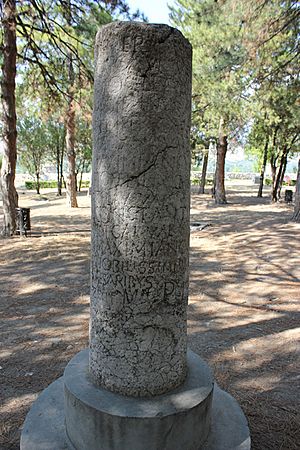Veni, vidi, vici facts for kids
The famous Latin phrase Veni, vidi, vici means "I came; I saw; I conquered." It is used to describe a quick and complete victory. This powerful phrase is often said to have been used by the Roman general and leader Julius Caesar.

Contents
What Does "Veni, Vidi, Vici" Mean?
The phrase Veni, vidi, vici is made of three Latin words. Each word is a verb in the past tense.
- Veni means "I came."
- Vidi means "I saw."
- Vici means "I conquered."
Together, they show how fast and easily a victory was achieved. It suggests that someone arrived, understood the situation quickly, and won without much trouble.
Who Said "Veni, Vidi, Vici"?
This famous saying is most often linked to Julius Caesar. He was a very important Roman general and politician. Ancient historians like Appian, Plutarch, and Suetonius wrote about him using this phrase.
Caesar's Quick Victory
According to Appian, Caesar used the phrase in a letter. He sent it to the Roman Senate around 47 BC. This was after he won a very fast war. He defeated Pharnaces II of Pontus at the Battle of Zela. This battle happened in what is now Zile, Turkey. Caesar's victory was so swift that he used these three words to describe it.
Plutarch wrote in his book Life of Caesar that Caesar used the phrase in a report. He sent it to a friend named Amantius in Rome. Suetonius also mentioned it in his book Lives of the Twelve Caesars: Julius. Suetonius said that Caesar even displayed these three words as an inscription. This was during his special celebration in Rome for his victory in Pontus.
See also
 In Spanish: Veni, vidi, vici para niños
In Spanish: Veni, vidi, vici para niños
- Isocolon
- List of Latin phrases
- Ut est rerum omnium magister usus
 | Victor J. Glover |
 | Yvonne Cagle |
 | Jeanette Epps |
 | Bernard A. Harris Jr. |

